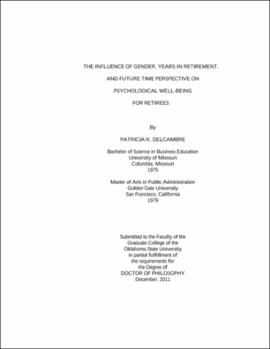| dc.contributor.advisor | Montgomery, Diane | |
| dc.contributor.author | Delcambre, Patricia Kathle | |
| dc.date.accessioned | 2013-11-26T08:34:22Z | |
| dc.date.available | 2013-11-26T08:34:22Z | |
| dc.date.issued | 2011-12 | |
| dc.identifier.uri | https://hdl.handle.net/11244/7365 | |
| dc.description.abstract | Scope and Method of Study: | |
| dc.description.abstract | The purpose of this study was to determine if gender, years in retirement and future time perspective predict the psychological well-being for retirees. This study examined psychological well-being using the 9-item version of the Scales of Psychological Well-Being (Ryff, 1989a). Future time perspective was measured using the 10-item Future Time Perspective Scale (Carstensen & Lang, 1996). A 9-item demographic survey provided study information on gender, education, marital status, retirement date, work history and sources of retirement income. Participants were recruited using the snowball method and two organizations allowed the researcher to ask their membership to participate in this study. A total of 141 participants completed surveys either on a paper or online version of the survey instrument. Age was not a qualifier; however, receiving retirement income was a requirement for participation in this study. Data were analyzed using a standard multiple regression and a mixed model ANOVA design. | |
| dc.description.abstract | Findings and Conclusions: The standard multiple regression analysis yielded a statistically significant result. Statistical significance was obtained between future time perspective and psychological well-being (r = .519; alpha= .01; r2 = .269) when considering all study participants resulting in 27% of the variability in psychological well-being attributed to future time perspective. This finding suggests future time perspective does affect psychological well-being. The mixed model ANOVA resulted in a statistically significant finding when gender was compared to the six subscales of the Scales of Psychological Well-Being. Men reached significance on the Autonomy subscale and women reached significance on the Personal Growth, and the Positive Relations with Others subscales. This finding suggests a gender difference in how psychological well-being is experienced. Theoretical and practical implications were explored as well as areas for future research. | |
| dc.format | application/pdf | |
| dc.language | en_US | |
| dc.rights | Copyright is held by the author who has granted the Oklahoma State University Library the non-exclusive right to share this material in its institutional repository. Contact Digital Library Services at lib-dls@okstate.edu or 405-744-9161 for the permission policy on the use, reproduction or distribution of this material. | |
| dc.title | Influence of gender, years in retirement, and future time perspective on psychological well-being for retirees | |
| dc.contributor.committeeMember | Harrist, R. Steven | |
| dc.contributor.committeeMember | Hull, Debra F. | |
| dc.contributor.committeeMember | Miller, Janice W. | |
| osu.filename | Delcambre_okstate_0664D_11818 | |
| osu.accesstype | Open Access | |
| dc.type.genre | Dissertation | |
| dc.type.material | Text | |
| dc.subject.keywords | future time perspective | |
| dc.subject.keywords | gender | |
| dc.subject.keywords | psychological well-being | |
| dc.subject.keywords | retirement | |
| dc.subject.keywords | retirement adjustment | |
| dc.subject.keywords | sociemotional selec | |
| thesis.degree.discipline | Educational Psychology | |
| thesis.degree.grantor | Oklahoma State University | |
